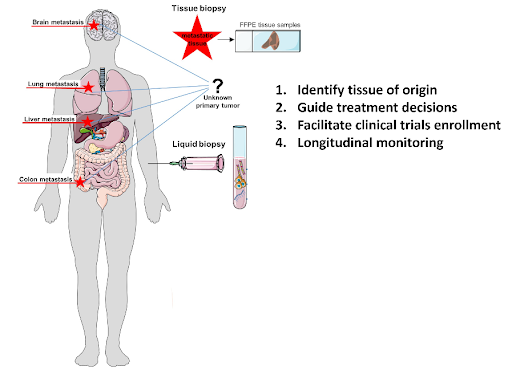Introduction
Cancer of unknown primary (CUP) is a heterogenous group of metastatic cancers in which the tumor’s origin remains unidentified despite extensive tests. This absence of a known primary origin complicates its management, as traditional treatment approaches are typically based on the tumor’s primary site and histology. However, recent advances in molecular diagnostics, particularly next-generation sequencing (NGS), have revolutionized the management of CUP by providing molecular insights into tumor biology, offering hope for better diagnosis and more targeted therapeutic options.
Identifying the tissue of origin
One of the most transformative roles of NGS in CUP lies in its ability to identify the likely tissue of origin of the cancer. Gene expression profiling identifies tissue-specific markers, while DNA methylation pattern reveals epigenetic changes unique to certain cancers. Additionally, DNA fragment signature provides further insights to pinpoint the tumor’s origin. By combining these approaches together with algorithms trained on large datasets of known primary tumors, NGS can predict the tissue of origin with high accuracy. This information is useful not only for diagnosis and prognostication, but also for selecting suitable therapy.
Guiding treatment decisions
Beyond classification, NGS plays a crucial role in expanding treatment strategies for patients with CUP by detecting actionable mutations driving the cancer. Like other cancers, CUP tumors can harbor specific genetic alterations that may respond to immunotherapies and targeted therapies, such as high tumor mutational burden (TMB) or mutations in genes like EFGR, ALK, BRAF, or NTRK. Identification of actionable mutations can also open the door to off-label use of targeted agents approved for cancers with similar molecular profiles. Thus, NGS enables a personalized treatment approach, which can potentially be more effective and have fewer side effects compared to chemotherapy, the standard of care for most CUP cases.
Facilitating enrollment in clinical trials
NGS also facilitates patient enrollment in clinical trials, offering access to cutting-edge therapies. Historically, clinical trials for CUP patients have been limited due to the difficulty in classifying these cancers based on histology. Many studies are now molecularly driven rather than based solely on tumor histology. This shift to a molecular approach is especially beneficial for patients with CUP. By matching CUP patients with clinical trials that are tailored to their molecular profiles, NGS allows these patients to have the best possible chance at receiving innovative therapies that can potentially improve their outcomes.
Longitudinal monitoring
Finally, NGS enables longitudinal monitoring in patients. Through the use of liquid biopsy, NGS allows continuous assessment by analyzing circulating tumor DNA (ctDNA) in the patient’s blood. Thus, NGS can be used to evaluate treatment response, track emergence of new mutations, and detect minimal residual disease in CUP patients. The information derived from longitudinal monitoring can then inform clinical decision-making, including treatment escalation, de-escalation, or guide the selection of alternative therapeutic options. This dynamic and responsive approach to treatment planning enhances the likelihood of better outcomes in managing the complex, evolving nature of CUP. Although CUP accounts for approximately 3-5% of all cancer diagnoses, its relative contribution to cancer mortalities is higher due to its aggressive behavior and the use of empirical treatments that are generally less effective and associated with poorer outcomes. NGS has become an invaluable tool in the management of CUP by enabling the identification of the tumor’s tissue of origin and the detection of actionable mutations. This has led to more precise diagnoses, tailored treatment strategies, and improved outcomes for patients with CUP.

Canary Oncoceutics has a steadfast commitment to three fundamental pillars: advancing scientific knowledge, fostering collaboration, and ultimately, enhancing the lives of cancer patients worldwide. From cutting-edge research to impactful clinical advancements, Canary Oncoceutics aims to illuminate the transformative potential of tailored cancer treatments. Join us on this journey towards a future where every cancer patient receives personalized, effective treatment tailored to their unique needs.